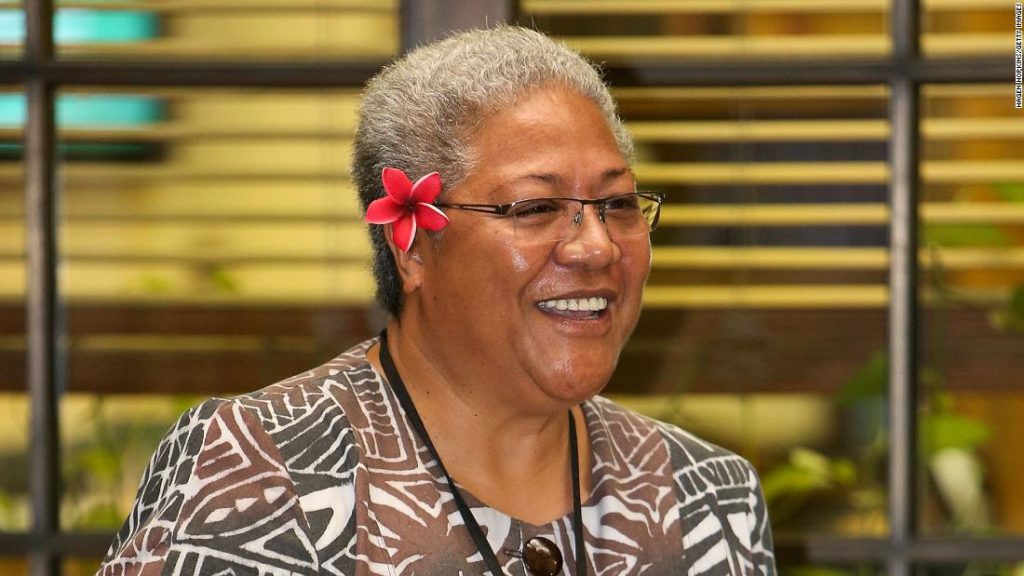Fiame Naomi Mata’afa’s Faith in the One True God (FAST) Party said the dramatic turn of events amounted to a “bloodless coup” following weeks of uncertainty after the country’s deadlocked April 9 election.
Although Samoa’s Supreme Court ruled Sunday that the order canceling the parliamentary sitting was “unlawful,” FAST arrived at Parliament Monday to find the doors locked, according to RNZ.
“I think a coup would be accurate,” FAST spokesman Lance Apulu told RNZ when asked to describe Monday’s events. “Bloodless, but they are actually coups.”
FAST went ahead with the swearing-in ceremony Monday in a tent, RNZ reported, although it is unclear how legitimate those proceedings will be. Monday is the final possible day a new parliament can be formed under the constitution.
But in a speech after the ceremony, Malielegaoi questioned its legitimacy, calling it a “joke,” RNZ reported.
“Only the head of state, and no one else, can call parliament meetings and swear people in. None of what they did is legitimate,” he said.
CNN has reached out to both HRPP and FAST for comment.
Patricia O’Brien, an expert in Pacific history at Australian National University, agreed the situation was getting close to a coup although there was no element of force, adding it appeared HRPP was suspending the democratic process and ignoring multiple rulings of the court.
The situation was unprecedented since Samoa became independent from New Zealand in 1962, she said.
How this happened
On the face of it, the fight over which party has the right to govern Samoa comes down to a gender quota rule.
Under Samoa’s constitution, at least 10% — or five of the 51 parliamentary seats — must be held by women. If the threshold is not met, then the highest performing unsuccessful female candidates are appointed. Five seats were won by women at the April 9 election, but that only constituted 9.8% of seats.
Kerryn Baker, a research fellow in Pacific Politics at Australian National University who specializes in gender representation, said it was hard to know how much of HRPP’s argument around gender quota was about commitment to the constitution — and how much was political maneuvering.
“Women’s representation and leadership has almost been weaponized in a way,” she said.
If Mata’afa’s FAST party is allowed to form the next government, that would make her Samoa’s first woman Prime Minister, and the only sitting female leader of any Pacific island country.
What happens next
O’Brien, from the Australian National University, said she expected incumbent Malielegaoi to pursue every option to stay in power.
“(Malielegaoi) has forgotten who he works for,” she said. “He’s never had to be answerable to the downside of democracy which is when you have to leave office. He’s basically ruled Samoa as a one-party state.”
“This is an extremely important litmus test for democracy in the Pacific and its retention,” she said, adding there was a risk HRPP’s actions could provoke unrest. “If he keeps pushing it, history tells us that things can get very ugly. It’s a very dangerous path to go down.”
She said there needed to be decisive action from democratic countries with a role in the region, including New Zealand and Australia.
On Monday, the Federated States of Micronesia became one of the first countries to formally recognize Mata’afa as the new Prime Minister.
You may also like
-
Afghanistan: Civilian casualties hit record high amid US withdrawal, UN says
-
How Taiwan is trying to defend against a cyber ‘World War III’
-
Pandemic travel news this week: Quarantine escapes and airplane disguises
-
Why would anyone trust Brexit Britain again?
-
Black fungus: A second crisis is killing survivors of India’s worst Covid wave

